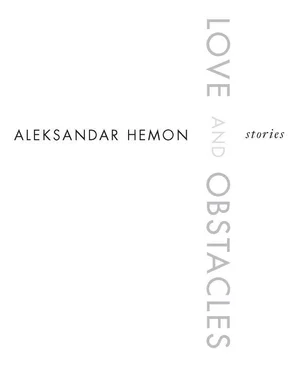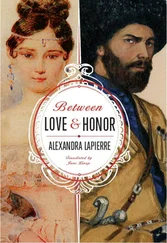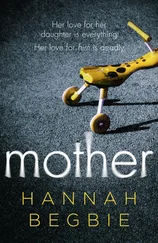Aleksandar Hemon - Love and Obstacles
Здесь есть возможность читать онлайн «Aleksandar Hemon - Love and Obstacles» весь текст электронной книги совершенно бесплатно (целиком полную версию без сокращений). В некоторых случаях можно слушать аудио, скачать через торрент в формате fb2 и присутствует краткое содержание. Издательство: Penguin USA, Inc., Жанр: Старинная литература, на английском языке. Описание произведения, (предисловие) а так же отзывы посетителей доступны на портале библиотеки ЛибКат.
- Название:Love and Obstacles
- Автор:
- Издательство:Penguin USA, Inc.
- Жанр:
- Год:неизвестен
- ISBN:нет данных
- Рейтинг книги:5 / 5. Голосов: 1
-
Избранное:Добавить в избранное
- Отзывы:
-
Ваша оценка:
- 100
- 1
- 2
- 3
- 4
- 5
Love and Obstacles: краткое содержание, описание и аннотация
Предлагаем к чтению аннотацию, описание, краткое содержание или предисловие (зависит от того, что написал сам автор книги «Love and Obstacles»). Если вы не нашли необходимую информацию о книге — напишите в комментариях, мы постараемся отыскать её.
Love and Obstacles — читать онлайн бесплатно полную книгу (весь текст) целиком
Ниже представлен текст книги, разбитый по страницам. Система сохранения места последней прочитанной страницы, позволяет с удобством читать онлайн бесплатно книгу «Love and Obstacles», без необходимости каждый раз заново искать на чём Вы остановились. Поставьте закладку, и сможете в любой момент перейти на страницу, на которой закончили чтение.
Интервал:
Закладка:
We stumbled up the porch, past a dwarf figure and a snow-covered rocking chair. Before Dedo could find his keys, Rachel opened the door. She was a burly woman, with austere hair and eventful earrings, her chin tucked into her underchin. She glared at us, and I have to say I was scared. As Dedo crossed the threshold, he professed his love to her with an accent so horrible that I thought for an instant he was kidding. The house smelled of chemical lavender; a drawing of a large-eyed mule hung on the wall. Rachel kept saying nothing, her cheeks puckering with obvious fury. I was willing now to give my life for friendship—I might have abandoned him in Sarajevo, but now we were facing Rachel together.
“This is my friend, Dirigent,” he said, propping himself up on his toes to land a hapless kiss on her taut lips. “He is conductor.” I made ridiculous conducting moves, as if to prove that I could still do it. She didn’t even look at me; her eyes were pinned on Dedo.
“You’re drunk,” she said. “Again.”
“Because I love you,” he said. I nodded.
“Excuse us,” she said, and pulled him deeper into the house, while I stood in the hallway deliberating over whether to take my shoes off. A little ball of dust moved down the hall, away from the door, like a scared dog. I recalled Dedo’s poem about the shoes he had bought the day before the siege started, which he would never wear, for they get dirty on the streets filthy with death. Every day he polished his new shoes with what could be his last breath, hoping for blisters.
He emerged from the house depths and said, “Daj pomozi” —Help me.
“Get the hell out, you drunken pig,” Rachel snarled in his wake. “And take your stupid friend with you.”
I decided not to remove my shoes and, stupidly, said, “It’s O.K.”
“It is not O.K.!” Rachel shouted. “It has never been O.K. It will never be O.K.”
“You must be nice to him,” Dedo screamed at her. “You must respect.”
“It’s O.K,” I said.
“Not O.K. Never O.K. This is my friend.” Dedo stabbed himself with his stubby finger. “Do you know me? Do you know who am I? I am biggest Bosnian poet alive.”
“He is the greatest,” I said.
“You’re a fucking midget, is what you are!” She leaned into him, and I could see his pointed-finger hand unfolding and swinging for a slap.
“Come on, midget,” Rachel bellowed. “Hit me. Yeah, sure. Hit me. Let’s have Officer Johnson for coffee and cookies again.”
Detergentlike snow had already covered our footprints. We stood outside on the street, Dedo fixated on the closed door, as though his gaze could burn through it, cursing in the most beautiful Bosnian and listing all her sins against him: her bastard son, her puritanism, her president, her decaf coffee. Panting, he bent over and grabbed a handful of snow, shaped it into a frail snowball, and threw it at the house. It disintegrated into a little blizzard and sprinkled the dwarf’s face. He was about to make another wretched snowball when I spotted a pair of headlights creeping down the street. It looked like a police vehicle, and I did not want to risk coffee and cookies with Officer Johnson, so I started running.
Dedo caught up to me around the corner, and we staggered down an alley in an unknown direction: the alley was deserted except for a sofa with a stuffed giraffe leaning on it. There were weak tire-mark gullies and fresh traces of what appeared to be a three-legged dog. We saw a woman in the kitchen window of one of the nearby houses. She was circling around something we could not see, a glass full of red wine in her hand. The snow was ankle-deep; we watched her, mesmerized: a long, shiny braid stretched down her back. The three-legged dog must have vanished, for the prints just stopped in the middle of the alley. We could go neither forward nor back, so we sat down right there. I felt the intense pleasure of giving up, the expansive freedom of utter defeat. Whichever way I go, now, I’ll reach the other shore. Dedo was humming a Bosnian song I didn’t recognize, snowflakes melting on his lips. It was clear to me that we could freeze to death in a Madison back alley—it would be a famous way to die. I wanted to ask Dedo about the poem he had written about me, but he said, “This is like Sarajevo in ’ninety-three.” Perhaps because of what he had said, or perhaps because I thought I saw Officer Johnson’s car passing the alley, I got up and helped him to his feet.
In the cab, it was only a question of time before someone vomited. The Arab cabbie despised us, but Dedo tried to tell him that he was a fellow Muslim. Madison was deserted.
“You are my brother,” Dedo said, and squeezed my hand. “I wrote a poem about you.”
I tried to kiss his cheek, as the cabbie glared at us in the rearview mirror, but awkwardly managed only to leave some saliva on his forehead.
“I wrote a good poem about you,” Dedo said again, and I asked him to tell it to me.
He dropped his chin to his chest. He seemed to have passed out, so I shook him, and like a talking doll, he said, “He whips butterflies with his baton. . . .” But then we arrived at my hotel. Dedo kept reciting as I paid for the cab, and I didn’t catch another word.
I dragged him to the elevator, his knees buckling, the snow thawing on his coat, releasing a closet-and-naphthalene smell. I could not tell whether he was still reciting or simply mumbling and cursing. I dropped him to the floor in the elevator and he fell asleep. He sat there in a pile, while I was unlocking the door to my room, and the elevator closed its doors and took him away. The thought of his being discovered in the elevator, drooling and gibbering, gave me a momentary pleasure. But I pressed the call button, and the elevator carrying Dedo obediently came back. We are never as beautiful as now.
The crushing sadness of hotel rooms; the gelid lights and clean notepads; the blank walls and particles of someone else’s erased life: I rolled him into this as if into hell. I hoisted him onto the bed, took off his shoes and socks. His toes were frostbitten, his heels brandished a pair of blisters. I peeled off his coat and pants, and he was shivering, his skin goose-bumped, his navel hidden in a hair tuft. I wrapped the bed-covers around him and threw a blanket on top. Then I lay down next to him, smelling his sweat and infected gums. He grunted and murmured, until his face calmed, the eyelids smoothing into slumber, the brows unfurrowing. A deep sigh, as when dusk falls, settled in his body. He was a beautiful human being.
And then on Tuesday, last Tuesday, he died.
Good Living
Back in the days of the war in Bosnia, I was surviving in Chicago by selling magazine subscriptions door-to-door. My employers thought that my Bosnian accent, clearly manufactured in the nether area of “other cultures,” was quirky, and therefore stimulant to the shopping instincts of suburban Americans. I was desperate at the time, what with the war and displacement, so I shamelessly exploited any smidgen of pity I could detect in lonely housewives and grumpy retirees whose doors I knocked at. Many of them were excited by my very presence at their doorstep, as I was living evidence of the American dream: here I was, overcoming adverse circumstances in a new country, much like the forebears of the future subscriber, presently signing the check and wistfully relating the saga of the ancestral transition to America.
But I had much too much of a dramatic foreign accent for the prime subscription-selling turf of the North Shore suburbs, where people, quaintly smothered by the serenity of wealth, regularly read Numismatic News and bought a lifetime subscription to Life Extension. Instead, I was deployed in the working-class suburbs, bordering with steel-mill complexes and landfills, and populated with people who, unlike the denizens of the North Shore, did not think that I coveted what they had, because they did not exactly want it themselves.
Читать дальшеИнтервал:
Закладка:
Похожие книги на «Love and Obstacles»
Представляем Вашему вниманию похожие книги на «Love and Obstacles» списком для выбора. Мы отобрали схожую по названию и смыслу литературу в надежде предоставить читателям больше вариантов отыскать новые, интересные, ещё непрочитанные произведения.
Обсуждение, отзывы о книге «Love and Obstacles» и просто собственные мнения читателей. Оставьте ваши комментарии, напишите, что Вы думаете о произведении, его смысле или главных героях. Укажите что конкретно понравилось, а что нет, и почему Вы так считаете.












